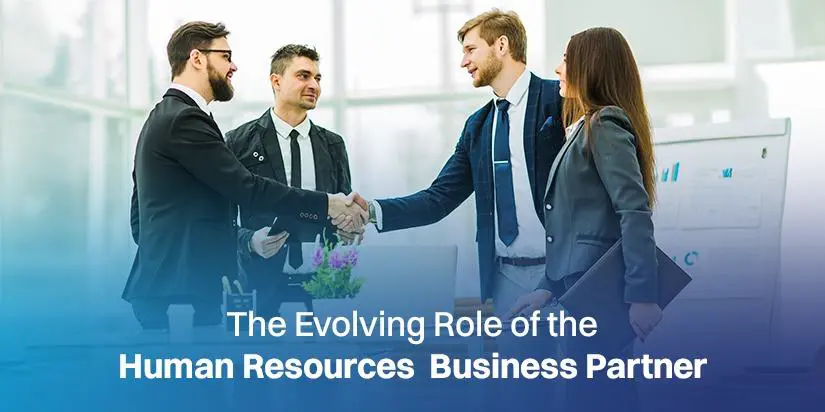The Human Resources Business Partner (HRBP) role is undergoing a dynamic transformation, driven by the ever-changing global business landscape. This document explores the key facets of this evolution, emphasising the need for HRBPs to be strategic advisors, business-savvy professionals, talent management experts, change agents, employee experience champions, digitally adept leaders, and globalization navigators. By embracing these aspects, HRBPs can drive business outcomes, foster talent development, and cultivate a positive employee experience.
Strategic Advisor: Aligning HR with Business Objectives
Strategic Alignment
A modern HRBP is a strategic advisor proactively aligning HR strategies with overarching business objectives. This involves a deep understanding of the organization’s vision, mission, and goals and translating them into actionable HR initiatives that drive performance and contribute to the bottom line. HRBPs collaborate closely with business leaders to identify opportunities for HR to add value, such as improving productivity, reducing costs, or enhancing customer satisfaction.
Insights and Analytics
Data-driven decision-making is paramount. HRBPs are expected to provide insights and analytics to inform business decisions and drive organizational performance. This includes gathering, analyzing, and interpreting HR data to identify trends, patterns, and opportunities for improvement. HRBPs use these insights to develop targeted interventions and measure the impact of HR programs on business outcomes.
By serving as strategic advisors, HRBPs ensure that HR is not just a support function but a key driver of business success.
Business Acumen: Speaking the Language of Business
Understanding Business Operations
Beyond traditional HR functions, HRBPs must understand in-depth business operations, including finance, marketing, sales, and technology. This business acumen enables them to make informed decisions, anticipate challenges, and contribute to strategic discussions. They must understand how the business generates revenue, manages costs, and competes in the marketplace.
Communicating Effectively
HRBPs must communicate effectively with business leaders, using business language and metrics. This includes presenting HR data clearly and concisely, framing HR initiatives in terms of their business impact, and tailoring their communication style to the audience. They need to be able to articulate the value of HR in terms that resonate with business leaders.
Cultivating business acumen empowers HRBPs to be credible and influential partners to the business.
Talent Management: Nurturing Future Leaders
Talent Acquisition and Management
HRBPs are responsible for developing and implementing talent management strategies and acquisition that meet business needs. This includes attracting, recruiting, selecting, and onboarding top talent as well as managing employee performance, development, and retention. They need to understand the skills and competencies required for success in the organisation, and develop programs to ensure that employees have the opportunity to develop those skills.
Succession Planning
Identifying, developing, and succession planning for future leaders is critical. HRBPs must work with business leaders to identify high-potential employees, provide them with development opportunities, and prepare them for future leadership roles. This ensures a pipeline of qualified leaders to meet the organization’s future needs.
Effective talent management strategies ensure the organization has the right people in the right roles, with the skills and competencies to drive business success.
Change Management: Guiding Organizational Transformations
Driving Organizational Change
HRBPs must be able to drive organizational change, including cultural transformations, restructuring, and mergers and acquisitions. This requires a strong understanding of change management principles and practices, as well as the ability to influence and engage stakeholders.
Communicating Change Effectively
Communicating change effectively to stakeholders, including employees, leaders, and customers, is paramount. HRBPs must be able to articulate the rationale for change, address concerns, and provide support to help employees adapt to the new environment. This includes developing communication plans, conducting training sessions, and providing ongoing support.
Employee Experience: Creating a Positive Work Environment
Positive Employee Experience
HRBPs are responsible for a positive employee experience, including employee engagement, well-being, and work-life balance. This involves creating a culture of recognition, providing opportunities for growth and development, and ensuring that employees feel valued and supported.
Culture of Feedback and Learning
Fostering a culture of feedback, continuous learning, and professional development is also critical. HRBPs must create systems for regular feedback, offering training and development opportunities, and encouraging employees to pursue their professional goals.
By prioritizing the employee experience, HRBPs can attract and retain top talent, improve employee engagement, and drive organizational performance.
Digital Transformation and Globalization
HR Technology
Leveraging HR technology, including AI, machine learning, and data analytics, is essential. HRBPs must stay up-to-date with the latest technologies and use them to improve HR processes, enhance employee experiences, and drive HR digital transformation for business outcomes. HRBPs must use data analytics to inform decisions on talent management, employee engagement, and organizational performance.
Global Workforce
HRBPs must develop strategies to manage a global workforce, including cultural awareness, language training, and expatriate management. Navigating cross-cultural differences and developing strategies to promote cultural awareness and understanding is crucial. HRBPs ensure fair and equitable treatment of all employees, regardless of their location or background.
Conclusion: The HRBP of the Future
The evolving role of the Human Resources Business Partner requires professionals to be strategic, innovative, and adaptable. They must be business savvy, data-driven, and focused on creating a positive employee experience. By embracing these changes, HRBPs can become true strategic partners to the business, driving organizational success and shaping the future of work. The modern HRBP is a multifaceted leader, adept at navigating complex challenges and driving positive change within the organization. As businesses continue to grow, the role of the HRBP will only become more critical in shaping the future of work.
